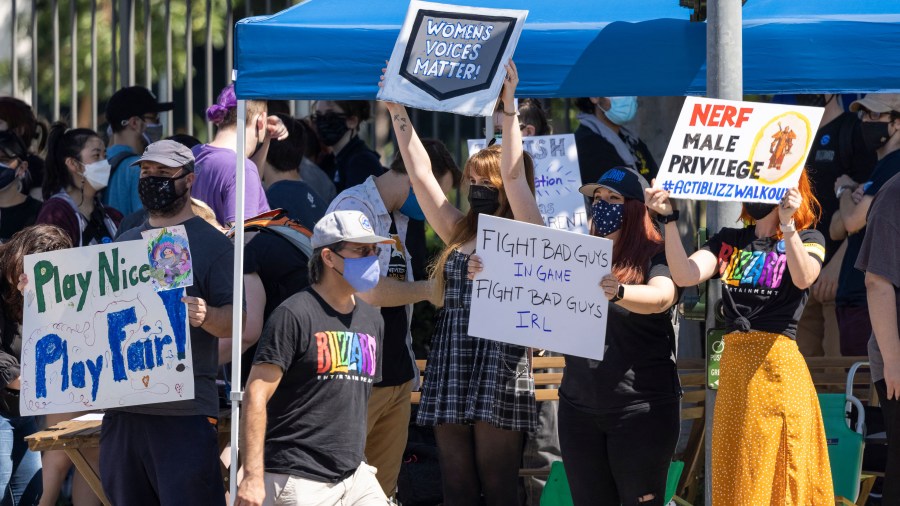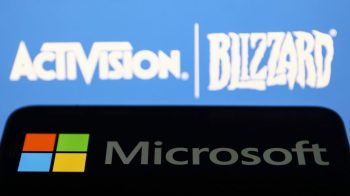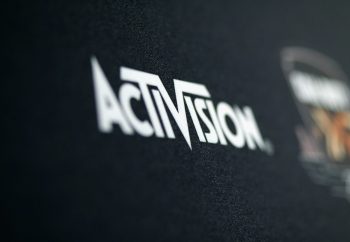The Activision Blizzard walkout could bring a reckoning for the video game industry

On Wednesday, hundreds of employees of video game company Activision Blizzard walked out. The protest followed a lawsuit from California regulators accusing the maker of World of Warcraft and Call of Duty of unfair pay and lack of advancement for women, and a “frat boy drinking culture” at the company. The suit details “cube crawls,” in which employees would go from cubicle to cubicle drinking, leading to unwanted advances and offensive treatment of women.
Management eventually apologized for its initial, dismissive response to the lawsuit and promised to investigate.
It’s a topic for Quality Assurance, where we take a second look at a big tech story. Sarah Needleman covers video games and technology for The Wall Street Journal. She said men have dominated the video game industry for years, despite a roughly 50-50 split among players. At Activision, only 20% of workers are women, California alleges. The following is an edited transcript of our conversation.
Sarah Needleman: Most of the big game companies only have a handful of women in high-level executive positions. And in most cases, women are in areas like communications or human resources, as opposed to the CEO spot or head of finance or even operations. And today, an estimated 227 million Americans play video games. That’s according to the Entertainment Software Association, which is a trade group. And they estimate about 45% are female and 55% are male, so almost half.
Meghan McCarty Carino: The video game industry gets compared to Hollywood a lot. But unlike Hollywood, there really aren’t a lot of unions or collective actions in gaming. Why is that the case?
Needleman: That’s true, actually, even in other areas of tech, but we’re starting to see more movement where unions are forming or taking a stand. And we saw that with Google, not too long ago, and there has been discussions of the video game industry in forming unions for years now, but they haven’t really come to fruition in a meaningful way. It is possible this particular lawsuit and the walkout will reignite those kinds of conversations and get it going forward. But it is pretty complicated to start a union, and so there have been some efforts that have been industrywide as opposed to on a company-by-company basis, but they just haven’t gained traction.
McCarty Carino: Why do you think it’s taken this long for video gaming to have this kind of reckoning with these issues like we’ve seen in other industries before?
Needleman: Well, I think part of the problem, and this was addressed in the lawsuit, is that women have gone to the human resources department and their complaints fell on deaf ears. So, when the HR department doesn’t have your back, it makes it less likely that other women are going forward. We’ve seen the vitriol and hate that comes across, even just on social media and also in gaming culture. A lot of women, they turn off their microphones when they’re playing online gaming because of the harassment they get from male players. It’s just so common — that’s something that you see integrated in most of the culture within the people who play games as well as the companies that make them.
McCarty Carino: How does what’s happening at Activision now compare to what previously happened at other companies, like Ubisoft, and the bearing that it might have on, its effect on the industry?
Needleman: Sure. I think one of the differences with Ubisoft, we saw social media pressure inspire some executives to step down, and certainly the power of social media is evident there. But in the case of Activision Blizzard, what’s interesting is that we have state regulators stepping in and charging the company with claims of harassment and abuse, etc. And so, it’s a lot different than when it’s an individual person speaking up, or even on social media where sometimes people are anonymous and you don’t know who they are. It’s different when a state government entity takes the reins and goes ahead and collects a lot of evidence — and we’re talking about a two-year investigation here. It just ups the ante in terms of how serious the charges are and very inspiring for women who have endured this kind of harassment to come forward now.
Related links: More insight from Meghan McCarty Carino
Sarah Needleman mentioned the often hostile environment among gamers online that sort of suffuses the whole industry. About a year ago, dozens of women flooded social media with accusations of harassment against video game streamers. Molly Wood talked to Anita Sarkeesian of Feminist Frequency about a hotline she helped create last year to offer emotional support to victims of abuse in games and online.
Again, as Needleman said, it’s that kind of environment that can make it difficult for workers at these companies to come forward, making it all the more important that the suit against Activision is being led by the state of California instead of just individuals on social media. Game critic Todd Martens points out in the LA Times that the basis for this suit has roots in a new law that took effect in California this year. It requires companies with 100 or more employees to report pay data to the state broken down by job, gender, race and ethnicity. Now, this only applies to companies with workers in California.
The federal agency in charge of ensuring workplace equity, the Equal Employment Opportunity Commission, did this for a little bit. But they don’t collect this kind of data anymore after the Donald Trump administration nixed the policy.
The future of this podcast starts with you.
Every day, the “Marketplace Tech” team demystifies the digital economy with stories that explore more than just Big Tech. We’re committed to covering topics that matter to you and the world around us, diving deep into how technology intersects with climate change, inequity, and disinformation.
As part of a nonprofit newsroom, we’re counting on listeners like you to keep this public service paywall-free and available to all.
Support “Marketplace Tech” in any amount today and become a partner in our mission.


















